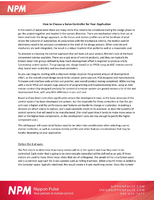Database Management Software offers built-in BI analytic functions.
Press Release Summary:
Providing transformational database technology to strengthen BI strategies, Teradata Database v14 offers features for workload management, temporal data capability, security, and application portability. Database is capable of columnar and row analysis, and virtual partitions allocate system resources between groups or business units within company. Also, hybrid storage intelligently discriminates between frequently used and least used data for accelerated processing.
Original Press Release:
Teradata Transforms Global Database Technology
The smartest database for the smartest business analytics
SAN DIEGO -- Teradata (NYSE: TDC), the leading analytic data solutions company, today announced the global release of Teradata Database 14, with over 80 new features and 60 new built-in analytic functions, providing customers with transformational database technology to empower breakthrough business intelligence strategies.
Teradata Database 14 advances global database technology with integrated hybrid column and row technology, and market-leading innovations that enhance workload management, multi-temperature data usage, temporal data capability, security, and application portability.
"The Teradata Database is the foundation for our valued customers who are making their organizations' business intelligence environment run faster, smarter, and far more intuitively," said Scott Gnau, president Teradata Labs, Teradata Corporation.
"Teradata's approach is to allow customers to exploit the right amount of memory and storage, both solid state and hard disk drives, which provides the best- performing data warehouse at the most competitive price."
Database Capable of Columnar and Row Analysis Teradata has integrated columnar capability into the Teradata Database design for optimization with other robust database capabilities. By integrating columnar within the core architecture, all of these capabilities build on each other creating results that are impossible to achieve when the features are isolated. This integration offers users a hybrid row and column database with the most comprehensive approach to tackling the most diverse performance challenges. "Teradata Columnar capability allows our customers to deliver better, faster analytics to more people. This unmatched performance and flexibility supports organizations grappling with massive volumes of data, growing user populations, and demands for better intelligence - all inside of their existing platform," said Gnau.
Unlike relational database management systems, which only store data in rows, a columnar database stores data in columns. Working separately, each method offers unique benefits, depending on the application and type of data. However, the new columnar capability from Teradata provides customers with the benefits of both. Teradata Columnar enables the Teradata Database to run faster, deliver high compression rates and offer the most comprehensive ready-to-use environment for organizations.
Workload Management
Teradata's workload management supports companies as they strive to leverage and exploit diverse types of data from diverse sources, as well as specialized applications. The data is exploding in volume - from massive volumes of traditional data, and emerging types of big data generated by social media, web interactions, e-commerce, sensors, machines, and mobile devices.
Teradata's industry-leading workload management now includes virtual partitions that allocate the system resources between groups or business units within a company. Once user priorities have been set, the Teradata Database dynamically manages resources across the system to assure that workloads are supported appropriately.
For example, a marketing department's allocation of the system resources to power customized product offers on the website gets top priority and runs as a tactical workload. In contrast, the strategy marketing team working on customer segmentation analysis receives fewer resources because it has a lower priority. At the same time and on the other side of the company, the finance department may define a very different workload management scheme within its partition based on a combination of applications and the calendar, so that month-end and quarter-end closing of financial reports have top priority when needed.
Industry's Only Intelligent "Hot" - "Cold" Data Storage Solution With big data becoming pervasive, there's a critical need for a database to be smart enough to dynamically judge how "hot" or "cold" data is for an organization. The Teradata Database has enhanced the use of hybrid storage to achieve more intelligent multi-temperature data management where the "hot" data is the most frequently used and "cold" data is least used. The hotter, more popular data needs to be located on the fastest storage devices, while less active, cooler data can be pushed onto slower, more economical storage.
The Teradata Database has the industry's only intelligent virtual storage solution that automatically migrates and compresses, or decompresses, cold data between drive types to achieve optimum performance and storage utilization. No staff intervention is required with Teradata's automated self-managing design. Cold data is compressed up to five times to keep disk storage costs to a minimum. In addition, Teradata Database 14 maximizes performance by keeping frequently used data in its natural decompressed format, avoiding repeated decompression processing.
With Teradata Columnar, data temperature measurements become even more targeted for the utmost system efficiency. By physically separating the storage for each column of data, the automated temperature tracking mechanism measures the temperature of each data field in a row separately and applies data placement and compression appropriately. For example, if the customer number and product SKU in a large sales table are used in most business intelligence queries, then these two columns of data will be stored on fast storage. At the same time, less frequently used data in the table will be automatically compressed and stored on slower storage.
First Temporal Capability Creates a Global Picture The Teradata Database is first to allow customers to create a full picture of an organization's business at any point in time. The temporal capability empowers customers to capture and track changes in their company as the business evolves over time. The Teradata Database temporal feature has been enhanced to create a globalpicture of the business, whichtakes advantage of the unique variations in global business calendars.
Security
Security has been bolstered with new Teradata Row Level Security, permitting only those with proper authorization to access information at granular levels. The level of security can be customized and be as deep and as layered as necessary. For example, regional sales managers may be given access to other regions' aggregate sales figures, while withholding individual sales staff bookings and compensation. Concurrently, human resources or sales administrators could see only a ranking of individual sales staff for incentive programs, but not given any access to aggregate or regional data.
Application and Data Migration
Teradata has expanded its ability to easily migrate applications and data from other less- performant platforms, and seamlessly manage emerging big data problems. New features in the Teradata Database make it even easier to migrate data and associated applications from competitive databases.
The Teradata Database is the high-performing analytical engine that powers all of the company's purpose-built platform family, including Teradata Active Enterprise Data Warehouse, Data Warehouse Appliance, Extreme Performance Appliance, Extreme Data Appliance, and the Data Mart Appliance. The Teradata Database 14 is also available as the software-only Data Mart Edition and Teradata Express for cloud computing solutions.
As a part of its data warehouse solution, Teradata partners with leading software vendors to serve its customers. These partners have tested and will support Teradata 14: Ab Initio Software, Ataccama Corporation, Atanasoft, Attensity, IBM: InfoSphere Information Server, InfoSphere Change Data Capture, InfoSphere Optim, InfoSphere Guardium, and IBM Cognos Business Intelligence (validation testing completed and will support within 90 days of final release); Informatica Corp, Information Builders, KXEN, McAfee, Inc., Microsoft Corporation, MicroStrategy, Narus, OPNET Technologies, Inc., Protegrity, SAS (testing and certification in process), Tableau Software, Thomson Reuters, Voltage Security, Ward Analytics, and Wherescape.
Relevant links
1. Teradata Database 14 article, Teradata Magazine http://teradatamagazine.com/v11n04/Tech2Tech/Bold-Steps-Advance-Data-Warehousing/
2. Teradata Columnar, Teradata Magazine
http://teradatamagazine.com/v11n04/Tech2Tech/Pillar-of-Performance/
3. B-Eye Network podcast on Teradata Database 14 and Teradata Columnar
http://www.b-eye-network.com/listen/15615
4. Teradata Columnar white paper
http://www.teradata.com/white-papers/Teradata-14-Hybrid-Columnar/
5. Teradata Database brochure
http://www.teradata.com/brochures/Teradata-Database-14/
About Teradata
Teradata (NYSE: TDC) is the world's leading analytic data solutions company focused on integrated data warehousing, big data analytics, and business applications. Teradata's innovative products and services empower organizations to integrate, analyze and profit from data for competitive advantage. Visit teradata.com for details.
Get to know Teradata.
Twitter: https://twitter.com/teradatanews
Facebook: http://www.facebook.com/Teradata
YouTube: http://www.youtube.com/user/teradata
LinkedIn: http://www.linkedin.com/company/teradata/products
Teradata is a trademark or registered trademark of Teradata Corporation in the United States and other countries
Twitter: Teradata provides customers with the smartest database for the smartest business analytics




